Stay in the know on all smart updates of your favorite topics.
E-Trucks: Is Trucking Still Hard to Electrify?

𝟭𝟬 𝘆𝗲𝗮𝗿𝘀 𝗮𝗴𝗼, 𝗵𝗲𝗮𝘃𝘆 𝘁𝗿𝘂𝗰𝗸𝘀 𝘄𝗲𝗿𝗲 “𝘁𝗼𝗼 𝗵𝗮𝗿𝗱 𝘁𝗼 𝗲𝗹𝗲𝗰𝘁𝗿𝗶𝗳𝘆.”
𝗡𝗼𝘄? 𝗙𝗹𝗲𝗲𝘁𝘀 𝗮𝗿𝗲 𝗽𝗿𝗼𝘃𝗶𝗻𝗴 𝘁𝗵𝗲𝘆 𝗰𝗮𝗻 𝘄𝗼𝗿𝗸 — 𝗯𝘂𝘁 𝗼𝗻𝗹𝘆 𝘄𝗵𝗲𝗻 𝗿𝗼𝘂𝘁𝗲𝘀, 𝗰𝗵𝗮𝗿𝗴𝗶𝗻𝗴, 𝗮𝗻𝗱 𝗼𝗽𝗲𝗿𝗮𝘁𝗶𝗼𝗻𝘀 𝗮𝗿𝗲 𝗶𝗻 𝘀𝘆𝗻𝗰.
On 𝟮𝟳 𝗔𝘂𝗴 2025 at 𝟭𝟬:𝟬𝟬 𝗖𝗘𝗦𝗧, we’ll break down exactly what works today, where the pain points still hurt, and how to electrify your fleet without disrupting your operations.
You’ll get:
• The biggest shifts in electric truck technology and adoption over the last decade
• Which fleets are running e-trucks successfully today — and where they still don’t fit
• The toughest operational and infrastructure hurdles (and why they persist)
• When e-trucks hit profitability based on TCO, range, and duty cycle
• A practical roadmap to start electrifying your fleet without disrupting operations
Speakers:
Tharsis Teoh, Smart Freight Centre — Perspective of the freight sector
Michael Ayres, Flexible Power Systems — Experience from live projects on depot charging
Rishabh Ghotge, Cenex Nederland — Live demo of KITE, a free tool for electrifying your truck fleets
Hosted by our favourite Sanne van Breukelen
Join us to cut through the noise and address the real barriers European fleets face.
Cenex, NextETRUCK, MACBETH Project, ALICE, Alliance for Logistics Innovation through Collaboration in Europe (ETP LOGISTICS), 2Zero , Connekt, Connectr - Energy innovation, ERTICO - ITS Europe, POLIS network, Niklas Schmalholz, Holly Nakatomi, Megan de Langen
Demoday #28: From Policy to Practice: Inclusive Design Ambitions of the Amsterdam Transport Authority
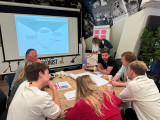
On the 5th of June, during the 28th Knowledge and Demo Day, we explored the topic of Inclusive Design in the context of mobility projects together with a diverse group of network partners. Iris Ruysch introduced the theme on behalf of the Amsterdam Transport Authority (Vervoerregio), while David Koop and Lotte de Wolde from our knowledge partner Flatland facilitated the session format, moderation and visual notes.
The ambition of the Amsterdam Transport Authority
The Amsterdam Transport Authority is responsible for public transport across fourteen municipalities in the region and is working towards a mobility system that enables people to travel quickly, safely and comfortably by public transport, bicycle or car. In addition to organising and funding public transport and investing in infrastructure, the Authority actively contributes to broader societal goals such as sustainability, health and inclusivity.
Inclusive mobility is one of the key themes within the wider mobility policy. The central principle is that everyone – regardless of age, income, disability, gender or background – should be able to travel well and comfortably throughout the region. This calls for a mobility system that is accessible, affordable, appropriate, socially safe and welcoming.
The aim of the session on 5 June was to work with the network towards an initial action plan for applying inclusive design principles in mobility projects. Iris is keen to ensure that the ambitions around inclusivity are not only stated in policy and vision documents but are truly embedded in the organisation – from policymakers to implementation teams.
Session set-up
After an introduction by Iris on the context and ambitions within the Transport Authority, we got to work. In small groups, participants explored the profile of the implementing civil servant (using a persona canvas) and considered desirable changes in approach; in terms of attitude, skills and collaboration.
We then used the Inclusive Design Wheel to examine how existing programme components of the Authority could be made more inclusive. In pairs, we tackled themes such as accessible travel information, social safety at stations (specifically for women), and improving bicycle parking facilities.
The Inclusive Design Wheel is an iterative process model that supports the structural integration of inclusivity into design and policy projects. The model emphasises collaboration, repetition, and continuous learning. It consists of four phases:
- Explore: Gather insights about users, their needs, and potential exclusion.
- Create: Develop ideas, concepts, and prototypes that address inclusive needs.
- Evaluate: Test whether the designs are inclusive, collect feedback, and make improvements where necessary.
- Manage: Ensure shared understanding, set goals, engage stakeholders, and embed the process.
Outcomes and insights
While the persona profiles were being developed, I observed the group discussions and noted several important insights to take forward in the development of the action plan:
- Awareness and concrete translation: Implementation teams often already have an intrinsic motivation to contribute to inclusivity goals set in policy. However, they may not always realise how their day-to-day work can support those goals. It’s important to continuously ask the question ‘How, exactly?’. Tools like checklists, templates and practical examples can support this translation from policy to practice.
- Flexible guidelines and not ‘extra work’: Given the differences in scale, pace and content of projects, guidelines need to be flexible. There must also be sufficient room in terms of time and budget. Most importantly, these guidelines and action plans should feel supportive, not like extra rules or bureaucracy. Too many rigid frameworks can backfire.
- Interaction between policy and implementation: There is a need for more two-way communication. Implementation teams want to be involved early in policy development, especially when they will be the ones carrying it out. They also want opportunities to reflect with policymakers on whether policy is being implemented as intended. This allows for timely feedback and course-correction based on real-world experience.
- An Inclusive Design mindset: Beyond sharpened policy documents and a stronger focus on the end user, Inclusive Design also requires a mindset – one that is inquisitive and reflective. Embedding this within the organisational culture will require more than just an action plan.
What’s next
Iris collected valuable input to kick-start the development of the action plan, and participants gained a better understanding of the Amsterdam Transport Authority, the principles of Inclusive Design, and what it takes to move from policy to implementation. This summer, a trainee will start at the Transport Authority to further develop this topic and the action plan. The session, this report, and Flatland’s visual notes provide a strong foundation to build on. We’ll be meeting with Iris and David to explore how we can support this follow-up.
Would you like to learn more about any of the topics or developments mentioned in this report? Feel free to email pelle@amsterdaminchange.com.
Innovation Dinner Arbeidsproductiviteit
𝐈𝐧𝐧𝐨𝐯𝐚𝐭𝐢𝐨𝐧 𝐃𝐢𝐧𝐧𝐞𝐫 '𝐕𝐞𝐫𝐡𝐨𝐠𝐞𝐧 𝐯𝐚𝐧 𝐚𝐫𝐛𝐞𝐢𝐝𝐬𝐩𝐫𝐨𝐝𝐮𝐜𝐭𝐢𝐯𝐢𝐭𝐞𝐢𝐭 𝐝𝐨𝐨𝐫 𝐀𝐈'– 𝐖𝐨𝐞𝐧𝐬𝐝𝐚𝐠 𝟏𝟑 𝐧𝐨𝐯𝐞𝐦𝐛𝐞𝐫
Ben jij actief binnen het MKB en wil je meer leren over hoe je AI eenvoudig en betaalbaar kunt inzetten om je bedrijfsprocessen te verbeteren? Kom dan naar ons volgende Innovation Dinner!
Dit keer met André Gerver als spreker. André is expert op het gebied van technologische innovatie, machine learning en artificial intelligence, vervult de rol van kwartiermaker voor het kernlectoraat Smart Industry én is programmaleider voor EDIH Digital Hub Noordwest.
Tijdens deze avond deelt hij praktische inzichten over:
✅ Toegankelijke AI-tools voor automatisering van repetitieve taken
✅ Inspirerende voorbeelden van bedrijven die al succes boeken met AI
✅ Manieren om je team te ontlasten zonder groot budget of technische kennis
✅ Hoe AI kan helpen om productief te blijven in een snel veranderende digitale wereld
Het Innovation Dinner is speciaal voor directeuren, ondernemers, HR-managers en leidinggevenden die de arbeidsproductiviteit binnen hun organisatie willen verhogen.
Wil je je aanmelden? Ga naar onze website of stuur een mail naar sem@bouwlab.com.
📍 Locatie: 3D Makers Zone/BouwLab R&Do, Oudeweg 91-95, Haarlem (gratis parkeren)
🕒 Tijd: Inloop vanaf 17:30 uur, diner van 18:00 – 20:00 uur
Let op: deelname is beperkt, we maken een selectie om ervoor te zorgen dat deelnemers optimaal profiteren van relevante connecties.
Data Dilemmas Recap: Using Data and AI for an Accessible Amsterdam
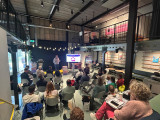
On September 26th, our community gathered in the AHK Culture Club at Marineterrein Amsterdam for our Datadilemma’s series. This edition focused on the use of Data and AI to create a more accessible Amsterdam. This article presents some of the key highlights and insights from the afternoon.
Together with the three speakers, Vishruth Krishnan, Hans Voerknecht, Michiel Bontenbal, and our audience we discussed how data and AI can help make our city more accessible for all. Which dilemma’s do we encounter when we use new technologies for an accessible city? How can data help to get more understanding of unequal access to mobility in the country? And what about sounds and noise pollution; how can data help make te city more livable?
What the three speakers had in common; a personal motivation to get away from the surface and dive deeper into the data, attempting to get closer to people’s experiences and perceptions. From an ordinary routeplanner, to one paying specific attention to challenges for people in weelchairs. From generic accesibility data for the region, to data highlighting the unequal distribution of access to mobility. And from recording noise levels, to measuring and classifying all different sounds in urban settings. In the paragraphs below, I will delve deeper into the different speakers and their topics.
Visruth Krishnan – Personalized Route Planner for People in a Wheelchair
To help individuals with limited mobility navigate the city more easily, the city’s innovation department has developed a prototype route planning tool. This route planner maps out the most accessible routes based on personal needs, considering preferences like maximum curb height at crossings, minimum sidewalk width, and whether to prioritize sidewalks or bike paths.
Visruth Krishnan, Data Scientist at the Innovation Department of the Municipality of Amsterdam, explained how data helps facilitate travel from point A to point B. However, to ensure route planning tools address the challenges faced by wheelchair users, we must feed these systems with data drawn from real-world experiences. A person’s journey might present specific challenges, such as detours, improperly parked bicycles, slopes, and narrow footpaths.
Working with a group of wheelchair users, Visruth studied the obstacles and experiences they encountered on their routes. This research generated precise data to feed the route planner, enabling it to provide personalized route suggestions that account for each individual’s freedom of movement.
Visruth presented several dilemmas encountered during the project:
- Subjectivity in the data: How busy is a sidewalk or intersection perceived to be? Are cyclists at a certain point fast and aggressive, or is that just a feeling?
- Minimal vs. comprehensive data collection: How much data should be gathered? While more data might provide deeper insights, it could also increase privacy risks.
- Accurate vs. timely data: Timely data may not always be accurate, and accurate data may not always be available in time for critical decision-making. Consider issues like illegally parked bikes, construction work, and terraces that vary in size and location depending on the season.
- Transparency vs. complexity: How transparent should data-driven processes be, especially when the algorithms or analytics behind them are complex? AI is often seen as a "black box"—people don’t understand how it works or how data is processed, which can lead to less trust from the start.
To address these challenges, Visruth and his team maintain an ongoing dialogue with the target audience. It’s an iterative process, and they keep the ‘human in the loop.’ The prototype is now ready, and hopefully, it can be further developed!
Hans Voerknecht – Unequal Accesibility and Data to Support The Narrative
Hans Voerknecht, strategist for sustainable accessibility at Een Nieuwe Kijk, presented the Integrated Perspective on Accessibility method, which he developed to get a deeper understanding of people’s accessibility. This method assists in collecting data and analyzing the severity of current inequalities and the effects of policy measures. The method has already been applied in nearly twenty projects, including four in the Amsterdam region, such as the Multimodal Future Vision of the Metropoolregio Amsterdam (MRA).
IKOB stands for "Integrale Kijk Op Bereikbaarheid" (Integrated Perspective/view on Accessibility). IKOB examines the travel time and costs that people face to reach their workplace by bike, car, or public transport and it visualizes how many jobs people can access from a specific area.
IKOB uses 'distance decay curves<strong>,'</strong> meaning that jobs located closer are given more weight than those further away. Travel time and costs are adjusted depending on the target group. Factors considered include income, access to a car, travel cost reimbursement, public transport options, and preference for a mode of transport (car, public transport, or bike). For people with a lower income, costs weigh more heavily than for those with higher incomes.
Throughout his talk, Hans discussed how data can be used to support a narrative, either consciously or unconsciously. Regional research on the state of mobility can quickly paint a positive picture if you're working with averages and fail to examine differences between people. There are groups that experience less access to mobility, and for whom this issue carries more weight due to financial constraints. The way data is researched and how deeply you investigate determines to what extent this group and their challenges are brought into focus.
One of the dilemmas Hans mentioned was the fact that poor accessibility is a personal experience. It’s subjective, and there can be a lot behind it. Regardless of the detail and quality of your data, you can never be completely sure if it truly reflects the human experience it’s supposed to represent.
Michiel Bontenbal – The Urban Sounds Sensor
Our third and final speaker discussed sounds and noise pollution in an urban environment. It may not seem to immediately fit with the rest of the speakers, but urban sound is also important to consider when creating an accessible and liveable city. Michiel Bontenbal, lecturer in business and IT courses at the Amsterdam University of Applied Sciences, told us more about the Urban Sounds sensor, developed in collaboration with the volunteer organization Sensemakers. He explained us more about the challenges they face with this AI-driven solution and raised some dilemmas in his work.
The Urban Sounds Sensor project was developed in response to the need for evidence of nighttime noise disturbances. It was crucial to be able to distinguish between different types of sounds, such as music, mopeds, alarms, doors, car noises, and honking.
Together with the volunteers from Sensemakers, Michiel designed the sensor in such a way that the recorded sounds are neither stored nor released. The microphone registers the sound, and the algorithm in the sensor immediately categorizes it within the device. This approach ensures privacy by design.
Training the sensor is still an ongoing process. Achieving high accuracy is challenging, as even humans sometimes have trouble identifying certain sounds. And, while measuring noise disturbances is definitely getting more attention in the city now. However, this specific method of distinguishing between sound categories is still lagging behind in both development and interest from government authorities.
Michiel concluded his presentation by discussing his dilemmas with the audience. One of his dilemmas, as expected, was about placing microphones in public spaces; how desirable is that, really? It's important to talk about ethics and privacy when measuring in public spaces, especially with a sound sensor that isn’t visible. His second point focused on the experience of city sounds. How you perceive sounds depends on personal experiences and preferences. Some people enjoy urban sounds, like the noise of a tram or ringing bike bells. People may have associations with certain sounds that determine whether they find them annoying, don't even notice them, or actually enjoy them. This is a factor that a sound sensor and the data it collects have difficulty accounting for.
Panel Discussion
After the presentations, we brought the speakers together for a panel discussion. Led by Chris de Veer, programme manager Mobility at Amsterdam InChange, there was an engaging conversation with the audience. To wrap things up, I’d like to highlight three key statements made by the speakers in response to some critical questions from the audience:
- "We often try to objectify the world with data, but there is no objective truth. However, diving deep into data can give you a better and more diverse understanding of an issue or region." – Hans
- "Data is always messy. If the data we input is messy, the outcome will also be messy. Garbage in, garbage out." – Michiel
- “The Route Planner method and platform could be of great use in gaining a better overview of building accessibility throughout the city.” - Visruth
Thanks to the speakers for their stories and to the audience for the lively discussions afterwards. Want to join us for our next Data Dilemmas event? The next edition of this series of open events will be announced soon. We’re also always open to new themes and topics for this series; we’re curious to hear about the data dilemmas you encounter in your work!
metaCCAZE - Summer Mobility Talks

Onder het genot van een hapje en drankje organiseren we vanuit het EU Horizon project metaCCAZE op 30 juli de Summer Mobility Talks. Met iedereen die nog niet op vakantie is, gaan we in gesprek over thema’s als autonoom varen, mobility credits, Intelligent Speed Adaptation en multimodale logistiek. De Summer Mobility Talks is een informele bijeenkomst voor iedereen die het leuk vindt om ideeën uit te wisselen over mobiliteit in de stad, én eenmooie gelegenheid om te netwerken.
Vanaf 15:30 uur staan de drankjes koud.
16:00 uur: korte introductie van het EU Horizon project metaCCaze
16:10 – 17:30: uitwisseling over thema’s en netwerken
Locatie: 027 Garage Marineterrein Amsterdam (Kattenburgerstraat 5, Amsterdam)
Iedereen is welkom om binnen te lopen, maar i.v.m. de catering horen we graag of je komt. Aanmelden kan via het Google Form.
Lees hier meer over het Europese metaCCAZE project.
Data Dilemma’s: Data and AI for an accessible Amsterdam
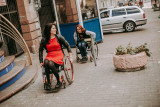
This event is postponed to September 26 (was first scheduled on July 16)
We often take daily activities such as commuting to work, independently taking public transport, grocery shopping or going to a restaurant for granted. Unfortunately, not everyone has this privilege. For people with reduced mobility (e.g., wheelchair users), getting around Amsterdam can be tricky. There are a lot of obstacles, such as narrow or bumpy pavements and high curbs.
The municipality of Amsterdam wants to be a free, just and sustainable city for all. For which the accessibility of the city is essential. With the Amsterdam for All initiative, the municipality of Amsterdam researches and experiments with how data and AI can be leveraged to ensure accessibility for its residents. How can the data and AI help to make our city more accessible for all? And which kind of dilemma’s does the city come across?
To help people with less mobility move around the city more easily, the city’s innovation department has created a prototype route planning tool. This route planner maps out the best accessible route for each person based on what they need. It considers preferences like maximum curb height when crossing the road, minimum sidewalk width, and a preference for using sidewalks or bike paths. Vishruth Krishnan, Data Scientist at the Innovation department of the municipality of Amsterdam, will tell you all about this route planner, the necessary data and the dilemma’s faces while using the data.
Hans Voerknecht, strategist for sustainable accessibility at Een Nieuwe Kijk, will speak about the Integrated Perspective on Accessibility method, which he developed to improve accessibility for people. This method assists in collecting data and analyzing the severity of current inequalities and the effects of policy measures. The method has already been applied in nearly twenty projects, including four in the Amsterdam region, such as the Multimodal Future Vision of the Metropoolregio Amsterdam (MRA).
Additionally, Michiel Bontenbal (Amsterdam University of Applied Sciences) tells us more about the Urban Sounds sensor, developed in collaboration with the volunteer organization Sensemakers. He takes us through the challenges they face with this AI-driven solution and presents his question: How can this technical solution best be used around the issue of accessibility?
Agenda
- 15:45 – 16:00 Walk-in
- 16:00 – 16:10 Welcome and introduction by Amsterdam InChange (formerly known as Amsterdam Smart City)
- 16:10 – 16:25 Demo of the Route Planner by Vishruth Krishnan (municipality of Amsterdam)
- 16:25 – 16:35 Hans Voerknecht, strategist for sustainable accessibility, on the Integrated Perspective on Accessibility method.
- 16:35 – 16:45 Michiel Bontenbal from Amsterdam University of Applied Sciences about the Urban Sounds sensor.
- 16:45 – 17:15 panel discussion
- 17:15 – 18:00 drinks
Location
The Culture Club, Amsterdam
About the Data Dilemma’s series
Data Dilemmas is a collaboration between Amsterdam InChange and the City of Amsterdam’s Data Lab. Four times a year we explore the possibilities for using data and new technologies to address urban and societal challenges, with a focus on responsible digitalization. The goal is to use data to make cities more safe, clean and accessible. But what happens to all the data that is collected? Which dilemmas do we encounter when we collect (personal) data to improve the city? These questions are important for everyone: governments, knowledge institutions, companies, and civil society. Amsterdam InChange would like to explore with you which decisions are needed for responsible use of data.
Revolutionise Recycling, Redefine Wealth: Seize the Opportunity with ByeBye Bed Limited and Reborn Products!

Greetings Trailblazing Visionaries,
Get ready for a seismic shift in sustainability! We're ByeBye Bed Limited, a force of innovation since 2019, experiencing a staggering 900% growth, and now we're inviting you to be part of our electrifying journey - Reborn Products.
The Powerhouse Behind ByeBye Bed Limited: Meet Paul Beckett, the maverick entrepreneur who saw a goldmine in recycling. His vision isn’t just about mattresses; it’s about transforming waste into a treasure trove of sustainable, retail-worthy products. The world is ready for this revolution, and we're leading the charge.
Dazzling Growth, Unstoppable Momentum: From a modest 6,000 sq. ft. to our current 60,000 sq. ft. facility, we've supersized our operation to revolutionise recycling on a grand scale. Brace yourself for a dedicated manufacturing facility that will catapult our capabilities into the stratosphere.
Reborn Products: Where Sustainability Meets Luxury: Our 'Reborn' products aren't just eco-friendly; they're a testament to style, comfort, and sustainability. From avant-garde mattresses to chic futon chairs and everything in between, we’re turning waste into opulence. Currently, 96% of our materials are recycled, making us the pinnacle of green innovation.
Crushing the Landfill Crisis: We're not just talking the talk; we're walking it, stomping on the UK landfill crisis that swallows almost 5,000,000 mattresses each year. We're not just recycling; we're redefining waste, turning it into a jaw-dropping spectacle of sustainability.
Financial Dynamo: Fueling the Future: Hold on tight because the next phase is a financial thunderstorm. We're not just enhancing the use of our recycled materials; we're rewriting the rules of industry, starting with furniture making. Imagine a world where our waste stream becomes the lifeblood of innovation.
Revolutionary Padding Material: Unleashing the Future: Introducing our game-changing padding material, birthed from our waste streams. It's not just 100% recyclable; it's a disruptor, challenging the status quo and reshaping the very fabric of eco-friendly living.
Invest in Tomorrow: ByeBye Bed Limited is the Future: This isn’t just a crowdfunding opportunity; it’s your ticket to invest in the future of sustainability. Join the movement, fuel the revolution, and be part of a success story that will be told for generations.
Social Impact: Building Lives, Breaking Chains: But wait, there's more! Our initiative with HMP isn’t just about recycling materials; it's about recycling lives. We're rehabilitating prisoners, re-skilling them for a triumphant return to society. And the best part? They potentially become integral members of our powerhouse workforce.
Your Invitation to Greatness: Investing in ByeBye Bed Limited and Reborn Products isn’t just about returns; it’s about being part of a seismic shift. This is your opportunity to be on the ground floor of something monumental.
Interested in More Details? Ignite the Revolution - Join Us Now: Email us for more details and become part of a future where recycling isn’t just responsible; it’s a lifestyle. Let's redefine waste, together.
Thank you for daring to dream big with ByeBye Bed Limited and Reborn Products.
Demoday #22: Inclusive Prosperity & The Case Of Experiments In Public Space
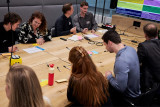
*This article makes use of the term Inclusive Prosperity as the English translation for the Dutch word; ‘Brede Welvaart’
In The Netherlands, the concept of Inclusive Prosperity* is on the rise. Policy makers are busy defining this concept, figuring out how to put this concept into practice and what it means for their decision-making process. Together with his colleagues at the Municipality of Amsterdam, Yurhan Kwee hosts sessions on decision-making along the principles of Inclusive Prosperity. With the input he gathers, he hopes to make the decisions needed for our Inclusive Prosperity ambitions more understandable and transparent, both for Amsterdam’s administrators and councillors as well as its citizens.
Inclusive Prosperity
Inclusive Prosperity is about more than just money. It involves everything that people consider valuable, such as health, the quality of education, the environment, a safe living environment, and equal opportunities for everyone. It's about the quality of life in the present, and the extent to which this affects the prosperity of future generations or those of people elsewhere in the world.
According to the definition, used by the Municipality, there are 8 themes to consider:
1. Subjective Well-being
Subjective well-being refers to the evaluation people make of their lives. Consider the question, "How satisfied are you with life in general?"
2. Health
The theme of Health encompasses physical illnesses and conditions, as well as mental health, living with limitations, perceived health, and self-regulation and resilience.
3. Consumption and Income
The theme of Consumption and Income refers to how income provides people with the freedom and opportunities to consume, including purchasing services and goods, maintaining a financial buffer, and shaping one's lifestyle.
4. Education and Training
Thinking about the theme of Education and Training involves the transfer of knowledge and skills, socialization, and considering the education or training experiences of individuals.
5. Spatial Quality and Cohesion
Regarding the theme of Spatial Cohesion and Quality, consider the following: a qualitatively well-designed space is a crucial precondition for the perceived broad prosperity. This includes spatial design on a functional level and with a focus on the future.
6. Economic Capital
Depending on the case, consider how it relates to:
- Human capital: the combination of competencies, knowledge, and skills;
- Physical capital: material possessions, such as machinery, buildings, and infrastructure;
- Knowledge capital: intangible assets, such as research and development, data, and patents;
- Financial capital: the financial resources of households and the government (purchasing power).
7. Natural Capital
Natural Capital refers to the stock of natural resources. Consider items such as (drinking) water, food, minerals, wind-sun-water energy, biodiversity, etc. Assess whether they are sufficiently available, in shortage, or if there is damage to these resources.
8. Social Capital
The concept of Social Capital often refers to the benefits of social networks, such as access to information and resources. This involves connections within and between groups. Positive effects can lead to trust, while negative effects can lead to loneliness.
Experimenting (with Mobility related policies) in public space
The case we used during this session is the use of experiments in public space, altering mobility or travel infrastructure. The months leading up to this afternoon, Amsterdam had put different experiments into practice (e.g. de ‘knip’ and de ‘paaltjesproef’) resulting in heated discussions, about both the success and desirability of using this method.
In a more objective manner, we used the Broad Prosperity principles to argue why its either desirable or undesirable to put such methods into practice.
Results
The group agreed that these Amsterdam experiments, concerned with creating calmer, more liveable urban areas, score well within themes like; Health (less air & noise pollution), Nature (more space for green and biodiversity), Social capital (more space and opportunity to meet and interact), Spacial quality (less dangerous and more moving space) and education (experimenting, learning by doing, viewing urban planning as experimenting and an ongoing learning process). However, as this year’s backlash on the experiments showed, there are some negative aspects to consider. Examples of domains in which we found some negative aspects, were; Economy (decreased speed and efficiency), Consumption & Income (local shop- and restaurant-owners need to be flexible and could be victims of changing infrastructure) and Subjective Well-being (citizens feel used, disadvantaged, and there is ambiguity about the purpose).
We found it difficult to arrive at a common answer because advantages and disadvantages exist on each theme separately. However, there was a common notion that the success of this method is rooted in clear and transparent communication on the effects and goals of such experiment. Frustration should be minimized and the opposing arguments should be taken seriously. Furthermore, we discussed the difference between a ‘real’ experiment in which every outcome is a success, and a trial, which is used to test a policy that’s envisioned for future years. The one who initiates the experiment should have this very clear for itself.
While one of the strengths of this method is the need to value these different domains in a more equal and objective manner, it proved to be difficult in practice. We all had the tendency to give some aspects more weight than others. While we were supposed to set up an advice and practice with decision-making along the principles of Inclusive Prosperity, it turned out to be challenging to let go of our prior experience, prejudices and opinions on this subject. We weren’t sure whether this is always a negative thing, but it’s one of the considerations Yurhan took home in the Municipality’s exploration of this approach.
Together, we experienced the challenge of working together with a new concept and approach. It should be an ongoing practice and discussion, a collective effort. Sessions like these serve that purpose perfectly.
Feel free to get in touch with me if you want to know more about the municipality’s and Amsterdam Economic Board’s efforts on the topic of Inclusive Prosperity.
Deelscooteraanbieder Check introduceert een veiligheidsslot
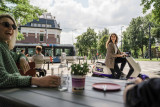
Deelscooteraanbieder Check introduceert vandaag een veiligheidsslot in haar app: de Safety Lock. De Safety Lock is ontworpen in afstemming met jongerenorganisatie TeamAlert. Met het slot kunnen gebruikers de eigen Check app tijdelijk blokkeren voor het reserveren van voertuigen. Op deze manier beschermt de gebruiker zichzelf tegen het (laagdrempelig) gebruik maken van scooters op een later tijdstip. Naast de Safety Lock introduceert Check ook een gerichte communicatiecampagne om gebruikers op relevante momenten te wijzen op de gevolgen van rijden onder invloed.
TeamAlert: ‘Actie nodig om dronken jongeren van deelscooter te houden’
In februari 2023 publiceerde TeamAlert, een organisatie die zich inzet voor de verkeersveiligheid van jongeren, een enquête waaruit blijkt dat ruim een kwart van de jonge deelscootergebruikers met een leeftijd tot en met 24 jaar wel eens onder invloed op een deelscooter stapt en de risico’s daarvan onderschat. De enquête was onder bijna duizend jongeren afgenomen. Naar aanleiding van het onderzoek riep TeamAlert gemeenten en deelscooteraanbieders op om in actie te komen en na te denken over oplossingen.
Deelscooteraanbieder Check introduceert de Safety Lock
Het onderzoek van TeamAlert, in combinatie met een landelijke toename van het gebruik van alcohol en drugs in het verkeer in 2022 (37,4% meer uitgedeelde boetes), is aanleiding geweest voor deelscooteraanbieder Check om in actie te komen. Op basis van meerdere gesprekken en feedbacksessies met deelscootergebruikers en verschillende autoriteiten op het gebied van verkeersveiligheid, waaronder TeamAlert, introduceert Check vandaag de Safety Lock. Met het slot kan elke gebruiker de eigen Check app tijdelijk blokkeren voor het reserveren van voertuigen. Op deze manier beschermt de gebruiker zichzelf tegen het (laagdrempelig) gebruik maken van scooters op een later tijdstip. Mochten gebruikers het slot toch willen deactiveren, omdat ze bijvoorbeeld niet onder invloed zijn, dan moeten ze eerst verplicht één minuut lang een tutorial over de gevolgen van rijden onder invloed bekijken. Gebruikers die het slot activeren worden gestimuleerd om hun Safety Lock te delen met vrienden om uit te dragen dat onder invloed zijn en rijden, niet samen gaat.
De Safety Lock helpt de gebruiker bij het maken van de juiste keuze
Saar Hadders, gedragsonderzoeker bij TeamAlert, legt uit hoe de Safety Lock gebruikers in staat stelt om de juiste keuzes te maken: “Onder sommige gebruikers geldt een sociale norm dat het rijden onder invloed op een deelscooter normaal is. Door het bedenken van een nieuwe feature om rijden onder invloed op deelscooters tegen te gaan, zendt Check een krachtige boodschap uit dat dit gedrag niet oké is. In de omgeving van jongeren zijn vrienden erg belangrijk in het creëren van een veilige sociale norm. Doordat de Safety Lock gebruikers stimuleert om de feature met hun vrienden te delen, wordt deze sociale norm versterkt.”
Hadders: “Jongeren hebben niet altijd de intentie om na een avondje stappen onder invloed te gaan rijden, maar door een combinatie van impulsiviteit en het effect van alcohol kan deze intentie vervagen. De Safety Lock biedt jongeren de mogelijkheid om zichzelf vóórdat ze hun eerste drankje drinken, te behoeden voor een onveilige rit naar huis. Wanneer gebruikers in de loop van de avond tóch van gedachten veranderen, deelt Check kennis over waarom het goed is om nuchter te rijden. Deze kennis kan helpen om alsnog het veilige gedrag te vertonen en ander vervoer te kiezen.”
De Safety Lock wordt versterkt door gerichte en relevante communicatie
Check heeft de communicatie om rijden onder invloed tegen te gaan opgedeeld in drie tijdvakken. De tijdvakken zijn gebaseerd op onderzoek van het SWOV. Afhankelijk van het tijdvak worden gebruikers aangemoedigd tot verantwoordelijk gedrag in het verkeer, bijvoorbeeld door gebruikers voorafgaand aan een avondje uit te attenderen op de mogelijkheid om het Safety Lock te activeren. Gebruikers die vrijdag- of zaterdagnacht tussen 23.00 uur en 06.00 uur een deelscooter willen pakken moeten eerst verplicht een tutorial kijken over de gevolgen van rijden onder invloed.
Walkability index for Amsterdam 🚶♀️

🚶♀️ How walkable is Amsterdam? 🚶♂️
🏘️ Ever wondered how pedestrian-friendly is your neighbourhood?
Do you feel encouraged and safe to walk in your surroundings?
Do the streets have too much traffic 🚦 and not enough trees 🌳?
Together with Vasileios Milias, we've developed CTstreets map, a new tool where you can check how your street scores in different walkability factors and what might be missing to make it more attractive for pedestrians.
👀 Explore the web tool here: https://miliasv.github.io/CTstreets/?city=amsterdam#15.18/52.371259/4.895385/0/45
🔍 Dive into the methodology and process on our info page: https://miliasv.github.io/CTstreets/info_page/
CTstreets is based on the results of my thesis "Amsterdam on Foot" where I developed a participatory approach to evaluate walkability in every street segment of Amsterdam using open data.
The categories available on the map are Overall walkability, Landscape, Crime Safety, Traffic Safety, Proximity and Infrastructure.
📍 With this tool, you can check how is the walkability per street, neighbourhood or walkshed (5 or 15 minutes) and switch between categories.
A disclaimer about the results presented: While based on the opinions of municipality workers, urban designers and advocates for pedestrian accessibility, this work might not reflect the opinion of everyone. After all, walkability is also influenced by personal factors. Furthermore, the data we used comes from open sources and it might not always be accurate / up to date. Ctstreets aims to enable the exploration of factors that impact walkability according to the experts in a simple, interactive, and fun way, and spark a conversation about how we think and design for pedestrians.
Kl Brouwerij #3: Klimaateerlijkheid

Kom op 29 november naar de KL Brouwerij, laat je inspireren door het theaterstuk ‘De zaak Shell’ en ontrafel samen met ons – midden in de buurt – de wirwar aan verantwoordelijkheden bij het aanpakken van de klimaatcrisis.
Een aantal keer per jaar organiseert Kennisland de KL Brouwerij. Dan laten we ons werk even voor wat het is en brouwen we samen nieuwe ideeën voor maatschappelijke uitdagingen. We brengen leven in de brouwerij door te ontdekken, smeden, broeden, fantaseren en borrelen. Dit doen we met partners, experts, ervaringsdeskundigen en betrokkenen bij het vraagstuk dat centraal staat, en waar we meer over willen leren. De derde KL Brouwerij staat in het teken van de klimaatrechtvaardige samenleving: hoe zorgen we ervoor dat iedereen op een eerlijke manier verantwoordelijkheid neemt in het aanpakken van de klimaatcrisis?
Hoe ziet een klimaatrechtvaardige samenleving eruit?
De klimaatcrisis is niet eerlijk. Rijke mensen, bedrijven en landen veroorzaken de meeste schade, terwijl vooral arme mensen de gevolgen voelen. Als we de klimaatcrisis willen stoppen, moeten we deze cirkel doorbreken. Maar wiens verantwoordelijkheid is dat eigenlijk en wie is er het eerst aan zet? De consument die zijn eigen klimaatvoetafdruk moet verkleinen? Vervuilende bedrijven die steeds meer winst maken en ondertussen profiteren van fossiele subsidies? Of de overheid die met wetten, regels en beleid belangrijke koerswijzigingen kan realiseren, maar dat te weinig doet? Tijdens deze KL Brouwerij ontrafelen we samen die wirwar. Dat doen we met theater, inspirerende buurtinitiatieven en vooral veel ruimte voor uitwisseling en gesprek.
De zaak Shell
We starten met live theater uit het prijswinnende stuk De zaak Shell. Regisseurs Anoek Nuyens en Rebekka de Wit bezochten Shells aandeelhoudersvergaderingen, ploegden door beleidsnota’s van de overheid en schreven mee met opmerkingen van familieleden aan het kerstdiner. In dit stuk komen alle stemmen in het klimaatdebat samen en zien we hoe elke partij de verantwoordelijkheid naar de ander doorschuift.
Klimaatrechtvaardigheid in de wijk
Na het theaterstuk brengen we dit gigantische onderwerp terug tot het niveau van de wijk. Hoe kunnen we ervoor zorgen dat de klimaatmaatregelen in wijken op een rechtvaardige manier vorm krijgen? We verhuizen voor deze editie van de KL Brouwerij naar buurthuis De Witte Boei, in het hart van de Oostelijke Eilanden, niet ver van het Marineterrein, midden in de buurt.
Kom ook en praat mee!
Deze KL Brouwerij vindt plaats op woensdag 29 november van 16.30-18.30 uur in buurthuis De Witte Boei op Kleine Wittenburgerstraat 201 in Amsterdam. Er is een beperkt aantal plaatsen, dus meld je snel aan via onderstaande link! Stuur voor vragen een mailtje naar Nina Sandford via ns@kl.nl.
18. Space for sporting and playing in a green environment

This is the 18th episode of a series 25 building blocks to create better streets, neighbourhoods, and cities. This message is about the limited possibilities for children to play in a green environment because of the sacrifices that are made to offer space for cars and private gardens
Almost all residential areas in the Netherlands offer too little opportunity for children to play. This post deals with this topic and also with changing the classic street pattern to make way for routes for pedestrians and cyclists.
Everything previously mentioned about the value of a green space applies to the living environment. The rule 3 : 30 : 300 is often used as an ideal: Three trees must be visible from every house, the canopy cover of the neighborhood is 30% and within an average distance of 300 meters there is a quarter of a hectare of green space, whether or not divided over a number of smaller parcels.
Functions of 'green' in neighbourhoods
The green space in the living environment must be more than a grass cover. Instead, it creates a park-like environment where people meet, it is accompanied by water features and can store water in case of superfluent rain, it limits the temperature and forms the basis for play areas for children.
Legally, communal, and private green areas are different entities; in practice, hybrid forms are becoming common. For example, a communal (inner) garden that can be closed off in the evening or public green that is cadastral property of the residents but intended for public use. In that case the residents live in a park-like environment which they might maintain and use together. Het Rivierdistrict in Utrecht is an example of this.
Play at the neighborhood level
Children want wide sidewalks and a place (at least 20 x 10 m2) close to home that is suitable for (fantasy) games and where there may also be attractive play equipment. The importance of playground equipment should not be overestimated. For many children, the ideal playground consists of heaps of coarse sand, water, climbing trees and pallets. To the local residents It undoubtedly looks messier than a field full of seesaw chickens. Good playground equipment is of course safe and encourages creative action. They can also be used for more than one purpose. You can climb on it, slide off it, play hide and seek and more. Of the simple devices, (saucer) swings and climbing frames are favorites.
A somewhat larger playground to play football and practice other sports is highly regarded. Such a space attracts many children from the surrounding streets and leads to the children playing with each other in varying combinations.
Squares
Most squares are large bare plains, which you prefer to walk around. Every neighborhood should have a square of considerable size as a place where various forms of play and exercise are concentrated. In the middle there is room for a multifunctional space - tastefully tiled or equipped with (artificial) grass - for ball games, events, music performances, markets and possibly movable benches. Ideally, the central part is somewhat lower, so that there is a slope to sit on, climb and slide down. On the edge there is room for countless activities, such as different forms of ball games, a rough part, with climbing trees, meeting places, spaces to hide, space to barbecue and walls to paint, but also catering and one or more terraces. Lighting is desirable in the evening, possibly (coloured) mood lighting. There is an opportunity for unexpected and unforeseen activities, such as a food car that comes by regularly, street musicians that come to visit, changing fairground attractions and a salsa band that comes to rehearse every week.
Such a square can possibly be integrated into a park that, apart from its value as a green space, already offers opportunities for children to play. Adding explicit game elements makes parks even more attractive.
Connecting car-free routes
Safe walking and cycling routes connect playgrounds, parks, and homes. They offer excellent opportunities to use bicycles, especially where they are connected to those of other neighbourhoods.
By seeing facilities for different age groups in conjunction, networks and nodes are created for distinctive target groups. The children's network mainly includes play areas close to home, connected via safe paths to playgrounds in the vicinity. Facilities especially for teenagers are best located somewhat secluded, but not isolated. Essentially, they want to fit in. The teenage network also includes places where there is something to eat, but also various facilities for sports and at a certain age it includes the entire municipality.
Follow the link below to find an overview of all articles.
15. Affordable housing

This is the 15th episode of a series 25 building blocks to create better streets, neighbourhoods, and cities. This post is about one of the most serious threats to the quality of the living environment, namely the scarcity of housing, which is also unaffordable for many.
In many countries, adequate housing has become scarcer and too expensive for an increasing number of people. Unfortunately, government policy plays an important role in this. But good policy can also bring about a change. That's what this post is about.
As in many other developed countries, for a large part of the 20th century, the Dutch government considered it as its task to provide lower and middle classes with good and affordable housing. Housing associations ensured the implementation of this policy. Add to this well-equipped neighborhood shopping centers, ample medical, social, educational and transportation facilities and a diverse population. When the housing shortage eased in the 1970s, the nation was happier than ever. That didn't take long.
The emergence of market thinking in housing policy
During the last decades of the 20th century, the concern for housing largely shifted to the market. Parallel to this, housing corporations had to sell part of their housing stock. Mortgages were in easy reach and various tax facilities, such as the 'jubelton' and the mortgage interest deduction, brought an owner-occupied home within reach of many. In contrast, the waiting time for affordable rental housing increased to more than 10 years and rental housing in the liberalized zone became increasingly scarce and expensive. In Germany and Austria, providing good housing has remained a high priority for the government and waiting times are much shorter. The photo at the top left part shows the famous housing project Alt Erla in Vienna. Bottom shows left six affordable homes on the surface of one former home in an American suburb and top right is the 'Kolenkit', a social housing project in Amsterdam.
The explosive rise in housing costs
In order to adapt housing cost to the available budget, many people look for a house quite far away from the place where they work. Something that in turn has a negative effect on the travel costs and the time involved. Others settle in a neighborhood where the quality of life is moderate to poor or rent a too expensive house. More than a million households spend much more than the maximum desirable percentage of income (40%) on housing, utilities, and transport.
Between 2012 and 2022, the average price of a home in the Netherlands rose from €233,000 to €380,000. In Amsterdam, the price doubled from €280,000 to €560,000. Living in the city is becoming a privilege of the wealthier part of the population.
It is often assumed that around 900,000 housing units will be needed in the Netherlands by 2030, of which 80% is intended for single-person households.
An approaching change?
It seems that there is a shift going on, at least in policy thinking. The aim is to build an average of 100,000 homes per year in the coming years and to shorten the lead time between planning and realization. Achieving these intentions is uncartain because construction is being seriously delayed by the nitrogen crisis. The slow pace of new construction has once again drawn attention to the possibility of using existing houses and buildings for a significant proportion of these new housing units. More so as it is estimated that 80% of demand comes from single-person households.
The existing housing stock offers large potential for the creation of new living spaces. This potential has been investigated by, among others, the Kooperative Architecten Werkplaats in Groningen, resulting in the report <em>Ruimte zat in de stad</em>. The research focuses on 1800 post-war neighbourhoods, built between 1950 and 1980 with 1.8 million homes, 720,000 of which are social rental homes. The conclusion is that the division and expansion of these homes can yield 221,000 new units in the coming years. Eligible for this are single-family houses, which can be divided into two, and porch apartment blocks, which can be divided into more units per floor. Dividing up existing ground-access homes and homes in apartment blocks is technically not difficult and the costs are manageable. This applies even more if the adjustments are carried out in combination with making the relevant homes climate neutral. In addition, huge savings are made on increasingly expensive materials.
Even more interesting is to combine compaction with topping. This means the addition of one or two extra floors, so that a lift can also be added to the existing apartments. In construction terms, such an operation can be carried out by using light materials and installing an extra foundation. A project group at Delft University of Technology has designed a prototype that can be used for all 847,000 post-war porch houses, all of which need major maintenance. This prototype also ensures that the buildings in which these homes are located become energy-neutral and include facilities for socializing and play. Hence the extra wide galleries, with stairs between the floors and common areas in the plinth (image below right).
Follow the link below to find an overview of all articles.
De stad van de toekomst bouwen ze in Almere in Minecraft
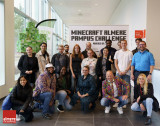
Met een spetterende kick-off door Justin Edwards, Director of Learning Programmes van Microsoft, zijn 200 studenten van hogeschool Windesheim Flevoland vandaag in teams gestart met het in Minecraft bouwen van het nog te realiseren stadsdeel Pampus. Bijzonder omdat Almere als tweede stad na London start met een Minecraft challenge voor de realisatie van een nieuwbouwopgave. Het winnende studententeam van Windesheim mag haar concept van 7 – 9 november presenteren in het Holland paviljoen tijdens de Smartcity Expo World Congres in Barcelona.
De komende anderhalf jaar biedt Almere honderden jongeren tussen de 8 en 21 jaar op deze unieke manier de kans om zelf op de stoel van de architect te zitten en zo mee te denken over grote maatschappelijke vraagstukken. Basisschoolleerlingen en studenten bouwen op hun eigen niveau aan een virtueel Almere Pampus. Dit als plek waar zij in de toekomst zelf willen wonen. Dit stadsdeel bouwen ze met een speciale versie van Minecraft Education Edition.
Wethouder Maaike Veeningen van Almere (Economische ontwikkeling, hoger onderwijs): ‘we dagen leerlingen tot 21 jaar uit om met oplossingen te komen voor vraagstukken op het gebied van duurzaam, energiezuinig en inclusief bouwen. Op deze manier leren zij bijvoorbeeld over het gebruik van Artificial Intelligence (AI), Virtual Reality (VR) en robotisering bij het ontwikkelen van een nieuw stadsdeel. Zo betrekken we onze toekomstige inwoners bij het bouwen aan de ideale stad van de toekomst.’
Toekomstige leefomgeving
Het toekomstige Almere Pampus wordt in het zuidwesten van Almere gebouwd, met meer dan 30.000 woningen en 16.000 arbeidsplaatsen. Projectdirecteur Almere Pampus en senior stedenbouwkundige bij de gemeente Almere Paola Huijding over de Minecraft Challenge: “Deze leerlingen zijn misschien de toekomstige bewoners van Pampus. Hiermee bouwen we aan woon- en werkplekken omringd door water en groen. Het is daarom zo mooi dat juist de toekomstige generatie nu meedenkt over hun leefomgeving.”
Digitaalvaardig
De speciale editie van Minecraft die de studenteams gebruiken is ontwikkeld door Iamprogrez. Het gebruik ervan moet op een speelse en laagdrempelige manier bijdragen aan een digitaal vaardige samenleving. Scholieren krijgen zo inzicht in de banen van de toekomst. Ook kunnen zij in een buddysysteem ouderen meenemen in hun digitale kennis en vaardigheden.
Fleur van Beem, Executive Director bij VodafoneZiggo: “Het vooruithelpen van twee miljoen mensen in de samenleving willen wij bereiken door initiatieven als Online Masters, een online lesprogramma voor scholen over de digitale wereld. De Minecraft Challenge sluit hierop naadloos aan en het is natuurlijk fantastisch om dankzij gamification jongeren digitaalvaardig te krijgen.”
Bouwen aan innovatieve concepten
De leerlingen kunnen alleen of in teams werken aan de challenge en krijgen hiervoor een digital skills-certificaat. Na de ontwerpfase, kunnen zij hun toekomstige visie op Pampus uploaden op de website van de Green Innovation Hub (GIH). Een groep experts kiest de winnaar. Danny Frietman, Projectdirecteur van de GIH: “De winnende uitkomsten van de Minecraft Challenge vormen de basis voor ons om start-ups en scale-ups uit te dagen om de concepten van de scholieren daadwerkelijk in de praktijk te brengen.”
“Hoe ziet het er dan uit”
Kijk HIER naar de video aankondiging van de eerder gehouden Minecraft-challenge in Londen. Daarin zie je duidelijk hoe de challenge werkt en welke mogelijkheden Minecraft hiervoor biedt.
Fotografie Daan Klunder, Almere City Marketing
GEMINI: Greening European Mobility through cascading innovation INItiatives
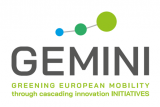
Context
At the heart of the GEMINI Project lies a commitment to fostering innovation and to accelerate the transition towards climate neutrality in mobility solutions.
Goal 11 of the UN Sustainable Development Goals advocates for access to safe, affordable, and sustainable transport systems. Nowadays, transport plays a significant role on air pollution and is one of the major sources of greenhouse gas emissions and is the only sector in the EU with increased Green House Gas (GHG) emissions compared to 1990.
The promotion of sustainable and innovative mobility solutions can help towards reducing GHG and carbon footprints, improving air quality, and achieving climate goals.
Project brief
The GEMINI Project (2023-2026 “Greening European Mobility through cascading innovation Initiatives” is a Horizon Europe funded project with 43 partners led by the Urban Electric Mobility Initiative (UEMI).
To accelerate the transition towards climate neutrality, GEMINI aims to foster widespread adoption of sustainable shared mobility solutions. To achieve this, the project will develop and test innovative business models for New Mobility Services (NMS) such as shared connected automated vehicles and shared mobility public transport through public-private partnerships. The NMS business models will be demonstrated in ten European Cities (Amsterdam, Copenhagen, Helsinki, Munich, Leuven, Ljubljana, Paris-Saclay, Porto and Turin).
Additionally, GEMINI will create digital tools and platforms that accommodate various mobility services, promoting collaboration and integration within the mobility sector. The project will actively engage stakeholders in the co-creation process, introducing Mobility as a Commons (MaaC) and incentivizing behavioural shifts and user acceptance of these new mobility options.
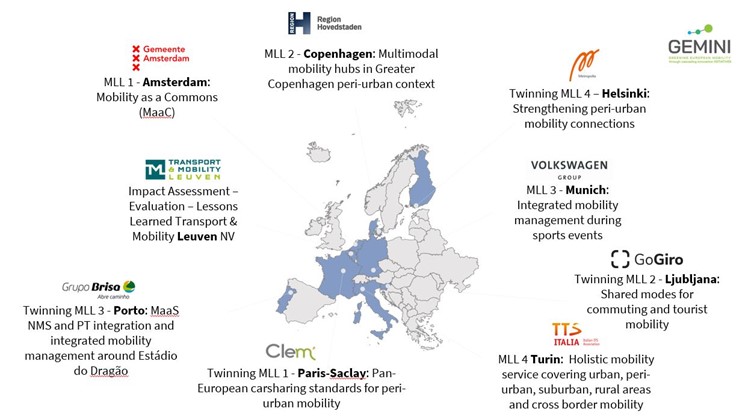
Furthermore, GEMINI will formulate policy recommendations to enable the scaling up and replication of successful mobility solutions. By aligning with Sustainable Urban Mobility Plans (SUMPs) and urban mobility planning frameworks, the project aims to contribute to a comprehensive policy package that guides and incentivizes future mobility innovations. The GEMINI project envisions fostering sustainable, accessible, and affordable shared mobility solutions that contribute to a safer and more environmentally friendly urban mobility landscape.
Objectives
- Develop and test sustainable business models for New Mobility Services (NMS) to increase shared mobility solutions (MaaS and MaaC) for various user groups, including enterprises, families, and tourists.
- Create digital enablers, including collaboration platforms and multimodal MaaS solutions, to integrate and facilitate a wide range of mobility services.
- Actively involve stakeholders in the co-creation of new mobility options and integrate Social Innovation practices to incentivize behavioural changes and user acceptance.
- Formulate policy recommendations to support the scaling up and replicability of successful mobility solutions, contributing to the development and implementation of SUMPs and urban mobility planning frameworks.
Cenex NL key contributions
The team plays a vital role in developing policy recommendations and technology roadmaps to accelerate the deployment of innovative mobility services. Through collaboration with local authorities in twinning cities, these roadmaps will align with the fast-track deployment of shared mobility trends in the short and medium term. Additionally, Cenex NL will contribute to the development of the Handbook consolidating the project’s learnings and offering practical guidance to cities and citizens across Europe.
This project has received funding from the European Union’s Horizon Europe research and innovation programme under grant agreement No 101103801.
Evenement: Unesco Werelderfgoed & Klimaat

Werelderfgoed & Klimaat
Ook wel eens gedroomd van zwemmen met schildpadden op de Galápagoseilanden? Of van een tripje naar Yellowstone? Overal in de wereld is prachtig Werelderfgoed te zien, maar reizen daarnaartoe heeft een keerzijde. De klimaatcrisis zorgt ervoor dat ook Werelderfgoed het steeds lastiger te verduren krijgt. Kijk bijvoorbeeld naar het unieke en onvervangbare Great Barrier Reef in Australië waarvan de toekomst onzeker is. En het is maar de vraag of je over dertig jaar nog droge voeten houdt tijdens een vakantie in Venetië.
Praat mee op 28 september 2023 met onder andere klimaatambassadeur Kiki Boreel en spoken word-artiest Zaïre Krieger over het klimaat en Unesco Werelderfgoed. We gaan het hebben over hoe we bijzondere plekken in de wereld kunnen beschermen tegen klimaatverandering en hoe jij zelf in actie kunt komen. Zo hopen we samen tot een oplossing te komen zodat we door middel van duurzaam reizen nog steeds de mooiste plekken van de wereld kunnen bezoeken.
Over Unesco Werelderfgoed
NEMO organiseert deze bijeenkomst in samenwerking met de Unesco Jongerencommissie, de Nederlandse Unesco Commissie en Stichting Werelderfgoed. De organisaties zetten zich onder meer gezamenlijk in om Werelderfgoed te beschermen en te behouden.
Programma
- Korte pitches door Ginger Weerheim (Nederlands Bureau voor Toerisme en Congressen) en Tom van Nouhuys (Forteiland Pampus).
- Spoken word door Zaïre Krieger.
- Panelgesprek door Ginger, Tom, Emmeline van der Leen (Jonge Klimaatbeweging) en Annemieke Visser (Tienskip).
- Tips voor duurzaam toerisme door de Unesco Jongerencommissie, over wat jij zelf kan doen.
Praktisch
Voor een bezoek aan dit evenement in De Studio reserveer je een apart ticket.
- Toegangsprijs regulier: € 7,50
- Toegangsprijs met CJP pas, college- of studentenkaart: € 3,75
Tickets zijn inclusief een bezoek aan de tentoonstelling Energy Junkies én een gratis drankje.
*De Studio van NEMO is een extra locatie van NEMO Science Museum op het Marineterrein in Amsterdam. De programmering is speciaal voor volwassenen.
foto: Belle Co op Pexels
Mobility Challenge: How do we make Carbon-neutral mobility to large events the norm?
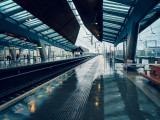
The climate is changing and Amsterdam is getting busier and busier. We are faced with the task of keeping the city, including Southeast, liveable, safe and accessible at the same time.Various events, concerts, sports competitions attract millions of visitors to Southeast every year. To bring all these visitors to the city in a more sustainable way, the municipality of Amsterdam, Johan Cruijff ArenA, Ajax, NS, GVB, Transdev, Transport Region Amsterdam and Amsterdam Smart City have joined forces. Their ambition is to make CO2 neutral travelling to and from large events the norm by the end of 2023.
Alternating travelbehaviour requires a diverse coalition
The car is currently still the most widely used means of transport in Southeast. The transition to sustainable mobility requires cooperation between (semi)public and private parties and the strengthening of sustainable alternatives to the private car. While reducing car- and parking accessibility, and placing bycicle parking options lays within the power of the municipality, the public transport providers posess all travel data and have the power to expand their transportcapacity. Moreover, to convince the supporters and fans to change their behaviour, you need the direct communication power from Ajax (Football Club) and the Johan Cruijff ArenA. Hence, you could say the challenge within the challenge is to find new forms of collaboration, data sharing, and fine-tuning the alignment of measures.
Short and long-term measures
The coalition of partners have developed an action plan and analysed crowd-and travel behaviour. During 2023, these findings initiated the shaping of first measures to influence the mobility choices of visitors. During the first pilot event at the end of May, bike parking facilities will be expanded and group transportation will be aranged for those living in so called 'public transport desserts'.
When speaking of long(er)-term measures, one could think of time-adjusted public transport supply, personal (digital) travel advice, and campaigns through Ajax and its supportersbase to raise awareness and appreciation of car-alternatives.
Upcoming disaster

Everyone should read the latest IPCC report. Current global policies are heading for a global warming of 3.2% in 2100. Although we have to continue emphasizing the necessity of radical policy change, at the same time, we must do more to mitigate the consequences of this increase in temperature.
I have made a short summary of the report (in Dutch), to be downloaded below
Demoday #19: Mobility as a Commons worksession
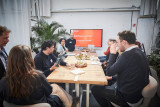
In the coming decades, urban population growth and a rising demand for mobility options will cause strain on our public spaces. The city of Amsterdam will counteract this trend by making private car ownership less attractive for its citizens, while making sure there are enough, well facilitated, alternative modes of transport. One could think of investments in (more) public transport, and the welcoming of shared mobility providers. Currently, some market players are making use of the latter and sharing cars and sharing mopeds are becoming part of the streetscape. Is this enough?
Mobility as a Commons
On the 23th of March, Diederik Basta and Jop Pék from the municipality of Amsterdam’s innovation department, hosted a working session on the concept of; Mobility as a Commons (MaaC). They introduced this concept by pointing out that currently, we’re not ‘sharing’ our modes of transport but we’re just ‘renting’ them from private companies. This raises a couple of concerns; these parties exist purely to maximize profits, they own and sell user data, their fleet of vehicles is not spread evenly throughout the city, and because it’s only available for those who can afford the service, it’s not inclusive for all.
The municipality is now exploring how to move away from these market mechanisms and facilitate car sharing solutions based in local ownership. This summer, they’ll experiment with pilots in which modes of transport are perceived as a ‘Commons’ and cooperatively owned and used by a group of local residents. Their goal is to gather insights on how to facilitate this form of locally organized mobility in the best way possible and pave the way for emerging initiatives.
Paradigm shifts
For this new alternative to succeed, drastic innovation is needed in which public authorities identify and alter their role. That’s why Diederik and Jop are also turning inwards and critically reflecting on the current premises from which they’re acting. Only then, you’ll be able to innovate in a way that you’re breaking free from your current paradigm and its effects. Because they are of such importance, I would like to quickly summarize the three relevant premises:
- People act out of self-interest; we assume mistrust. People need control and governance to reinforce the common good. Its effects: A government mistrusting its citizens and legal sealing of documents and procedures.
- The municipality owns public space. Public space should be designed and managed by experts to ensure quality, consistency and efficiency of functionalities. Its effects: Struggles with public participation and a focus on efficiency and functionality, instead of social interaction.
- The municipality is responsible for a well-functioning mobility system. Public space makes way, and more urban mobility makes people richer and happier. Its effects: Private parties push the mobility system and the government facilitates this, and traveling for work and other (social) activities is the norm.
Reactions from the participants
Next to inspiring the working session participants, Diederik and Job wanted to ignite an active conversation with the diverse group in front of them. They wanted to show the parties at the table how important it is to realise from what kind of premises and paradigm you’re currently ‘innovating’, but they were also curious what others thought of their upcoming project.
A big theme during the discussion was the fact that this ‘commons’ thinking is finding its way within different themes like the energy- and data transition. Energy cooperatives are emerging at a fast rate and this topic is receiving a lot of research and attention from energy companies at the moment. The same goes for cooperative ownership and use of data, as an alternative to protection and the commercial use of data. The different domains should be actively learning from each other, as learnings should be easily transferable. Furthermore, the group discussed the painful dilemma of the innovation department of the municipality. Their critical stance against their own policies is remarkable, but they need to find a balance where the pilot and its results will be refreshing and creative, as well as applicable in current policies as soon as possible. Finally, the group advised the presenters to; pay special attention to groups of citizens who have less time and resources available to organize themselves, write down in detail all administrative rules and obstructions that counteract these initiatives, and to not forget the power of private parties altogether; with a clear problem definition, they are able to organise and act at a fast rate.
What’s next?
In the coming months, the project’s final preparations and consideration will be implemented. Through the Horizon 2020 (GEMINI) project, The municipality of Amsterdam will cooperate with parties like Townmaking, Smart Innovation Norway, and our partner Cenex Nederland. Together they will guide and research local initiatives within Amsterdam (e.g. de Pijp, Tuindorp Oostzaan, Spaarndammerbuurt), activate a so called ‘Experimenteerregeling’ and create a plug and play system for future local initiatives. Diederik and Jop will incorporate the comments and discussions from this working session, and we’ll make sure to have them share their first learnings with the Amsterdam Smart City network later in 2023.
Do you want to know more about this topic, or would you like to get in contact with Diederik Basta or Jop Pék? You can contact me via pelle@amsterdamsmartcity.com, and I’ll connect you!
Hubs: hét alternatief voor autobezit?
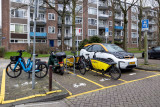
Hoe houden we de stad leefbaar en bereikbaar voor iedereen? En hoe kunnen mobiliteitshubs hieraan bijdragen? Kom op donderdag 6 april naar de presentatie over de BuurtHubs pilot in Amsterdam. Projectleider Diederik Basta vertelt hier meer over de resultaten en geleerde lessen van BuurtHubs in Amsterdam: mobiliteitshubs in de buurt met elektrisch deelvervoer.
Hoe zijn de BuurtHubs gebruikt en wat is het effect op de openbare ruimte? Hoe is de buurt betrokken geweest bij de inrichting en realisatie? En welke effect op autobezit zien we? Je hoort er meer over tijdens deze presentatie. Verder wordt je meegenomen in de werkwijze van het Stedelijk Innovatie en R&D team van gemeente Amsterdam, waar vooronderstellingen en ethische afwegingen een belangrijke rol spelen.
Datum: donderdag 6 april 2023
Tijd: 16:00-17:00
Locatie: DataLab Amsterdam, Weesperstraat 113 BG, 1018 VN Amsterdam
Meld je nu aan via
https://www.meetup.com/nl-NL/datalab-amsterdam/events/292360391/
Over de BuurtHubs
Als onderdeel van het Europese eHUBS project zijn er de afgelopen 4 jaar 17 BuurtHubs gerealiseerd in de stad. In een BuurtHub wordt elektrisch deelvervoer aangeboden. Denk aan een fiets, bakfiets, scooter, of auto. Allemaal schoon, elektrisch en gebruikt door Amsterdammers uit de buurt. Met de BuurtHubs is onderzocht of deze bijdragen aan:
· het verbeteren van de bereikbaarheid van een wijk of buurt
· het stimuleren van gebruik van schoon deelvervoer
· de luchtkwaliteit
· het vergroten van de leefbaarheid
· het verlagen van de CO2-uitstoot in de stad
Alvast meer weten?
We delen de geleerde lessen en handige tools van het BuurtHubs project graag met andere steden, organisaties en bewoners die aan de slag willen met zo’n mobiliteitshub of er meer over willen weten. Lees hier de Handreiking eHUBS: https://www.amsterdam.nl/innovatie/handreikingen-mobiliteit/
Stay up to date
Get notified about new updates, opportunities or events that match your interests.

